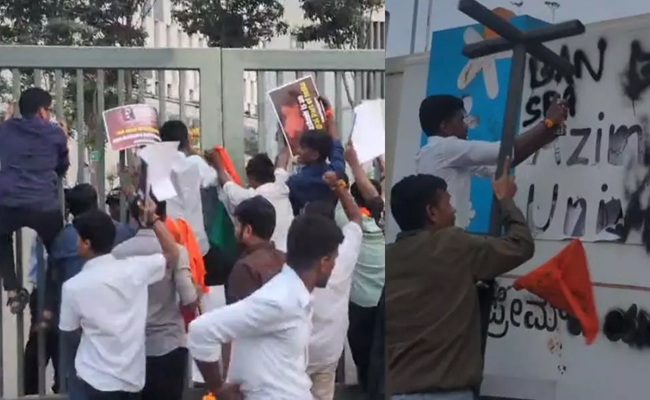Barcelona (PTI): Dani Alves, one of the most successful soccer players of his generation, was found guilty of raping a woman in a Barcelona nightclub and sentenced to four years and six months in prison.
The former Brazil and Barcelona right back was on Thursday convicted in Spain under a new sexual liberty law that emphasises the lack of consent of the victim as key to determining sex crimes.
A three-judge panel at the Barcelona Provincial Court convicted the 40-year-old Alves of sexual assault for the incident on December 31, 2022.
The court ordered Alves to pay 150,000 euros (USD 162,000) in compensation to the victim, banned him from approaching the victim's home or place of work, and from communicating with her by any means for nine years.
''I still believe in the innocence of Mr Alves,'' Inés Guardiola, Alves' lawyer, said. ''I need to study the ruling, but I can tell you that of course we will appeal.'' Guardiola said Alves was ''calm and collected'' when he heard the verdict in court.
''We are satisfied,'' David Sáenz, a member of the victim's legal team, said, ''Because this verdict recognises what we have always known, that the victim told the truth and that she has suffered.'' The victim's lawyer, Ester García, said on Wednesday she and her client would not be present for the verdict.
The victim said Alves raped her in the bathroom of a Barcelona nightclub on the morning of December 31, 2022. The court considered it proven that the victim did not consent to sex and there was evidence, in addition to the defendant's testimony, that she was raped.
Alves denied during the three-day trial this month that he raped the woman, testifying to the court ''I am not that kind of man.'' State prosecutors had sought a nine-year prison sentence for Alves while the lawyers representing his accuser wanted 12 years. His defense asked for his acquittal, or if found guilty a one-year sentence plus 50,000 Euros compensation for the victim.
The sentence of four years and six months is near the lowest sentence for a rape conviction, which when the rape took place was penalized by four to 12 years under Spanish law. That has since been modified to six to 12 years. The court in its sentence said it considered favorably for Alves that he had ''before the trial paid the court 150,000 Euros to be given to the victim without any conditions attached.'' Sáenz said his legal team did not agree with the application of the extenuating circumstance, saying the money did not compensate the harm done to their client. During the trial, medical experts testified she was suffering from post-traumatic stress.
''Clearly (it does not compensate), but that is what the court decided,'' Sáenz said. ''We have to examine the sentence to see if its contents are adequate for his acts.'' The state prosecutor's office said it will study the verdict and consider whether to appeal.
Spain Deputy Prime Minister Yolanda Díaz said she hoped the verdict ''serves as an exemplary measure for all the sexist behaviours that women suffer in all areas of our lives.'' The Alves case was the first high-profile sex crime since Spain overhauled its legislation in 2022 to make consent central to defining a sex crime in response to an upswell of protests after a gang-rape case during the San Fermin bull-running festival in Pamplona in 2016. The legislation popularly known as the ''only yes means yes'' law defines consent as an explicit expression of a person's will, making it clear that silence or passivity do not equal consent. The law, however, initially led to reduced sentences for hundreds of sex offenders because it set up lower minimum sentences, like the one applied to Alves, before being reformed.
Irene Montero, the former equality minister who championed the ''only yes means yes'' law, welcomed the ruling.
''The sentence against Dani Alves clearly establishes that he committed sexual assault because the victim did not consent. It is the result of the feminist fight for the right to sexual freedom and for putting consent at the center,'' she wrote on X, formerly Twitter.
Guardiola based her defense during the trial on video from the nightclub security cameras that she said showed how the woman danced "with sexualized movements" that ''showed her interest'' in Alves before the alleged assault.
García, the victim's lawyer, said at the close of the trial that the new law made it irrelevant how her client may have behaved with Alves beforehand.
''I don't care (how she was dancing), when she said No', that meant No.' That is why the law was changed,'' García said. ''The debate is no longer whether the victim put up resistance.'' Alves has been in jail since being detained on January 20, 2023. His requests for bail were denied because the court considered him a flight risk. Brazil does not extradite its own citizens when they are sentenced in other countries.
The victim told state prosecutors she danced with Alves and willingly entered the nightclub bathroom, but that later when she wanted to leave he would not let her. She said he slapped her, insulted her and forced her to have sexual relations against her will.
Let the Truth be known. If you read VB and like VB, please be a VB Supporter and Help us deliver the Truth to one and all.
Bengaluru (PTI): Karnataka Minister M B Patil on Tuesday chaired meetings with industry representatives from the aerospace and defence, machine tools, auto/EV, and green energy sectors to discuss sector growth and government support measures.
The meetings were attended by leading industrialists and their representatives, with some participating virtually.
Speaking on the occasion, the minister for Large and Medium Industries said Karnataka is at the forefront of the country’s aerospace and defence sectors.
He noted that Suzuki and Toyota plan to launch aerial taxi services in Japan by 2028, with Bengaluru-based Sasmos supplying electrical equipment for the project.
Industrialists suggested introducing similar “fly-taxi” services in Karnataka through an appropriate policy, which Patil said would be examined seriously.
The minister highlighted the need to establish testing centres and Common Facility Centres for the aerospace and defence industries and assured that these facilities would be provided.
Suggestions were also made to prepare a comprehensive roadmap for sector growth.
Karnataka has urged the Central Government to approve Defence Corridor projects in the Bengaluru North–Kolar–Chikkaballapur and Dharawada–Vijayapura–Belagavi regions.
Industrialists also suggested a corridor between Bengaluru and Mysuru, Patil said.
He said Karnataka aims to become a hub for defence electronics manufacturing, with plans to establish a 200-acre Defence Electronics Park and a 100-acre Avionics and Sensor Park.
These projects will be implemented once the Special Investment Region is operational, and land availability will not be an issue.
On the machine tools sector, Patil said the industry has recorded an annual turnover of Rs 36,500 crore and is witnessing steady growth.
Large-scale exhibitions have increased demand, and the state must strengthen its capabilities to develop control systems for heavy machinery. One testing unit is already operational in Bengaluru, with another planned for Tumakuru. Expansion of vocational training institutes in industrial areas is also underway.
In the Auto and EV sector, Vision Group members highlighted the need for a network of dry ports and more EV charging stations across the state.
Patil noted that the Tata Group is manufacturing EV buses in Dharawada for nationwide supply. Plans for mini excavator production and export facilitation were also discussed, along with the establishment of a testing facility for two-wheeler EVs.
For the Green Energy sector, the group emphasised the need for a suitable policy on battery-based energy storage and the establishment of data centres.
Patil assured that the government will seriously consider all suggestions and respond positively.





_vb_21.jpeg)